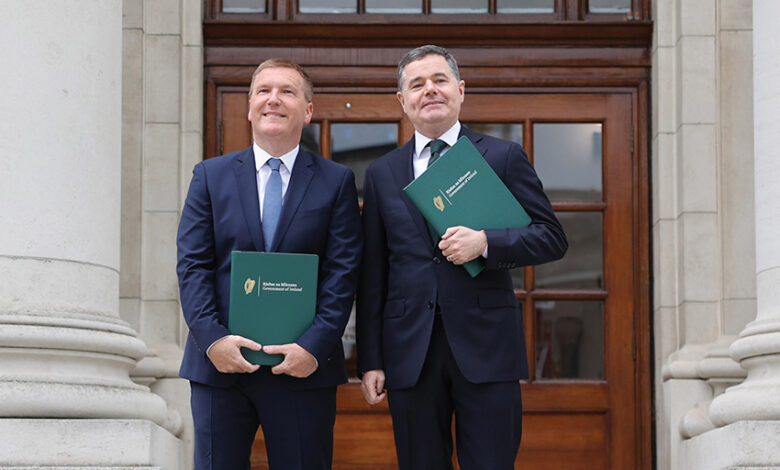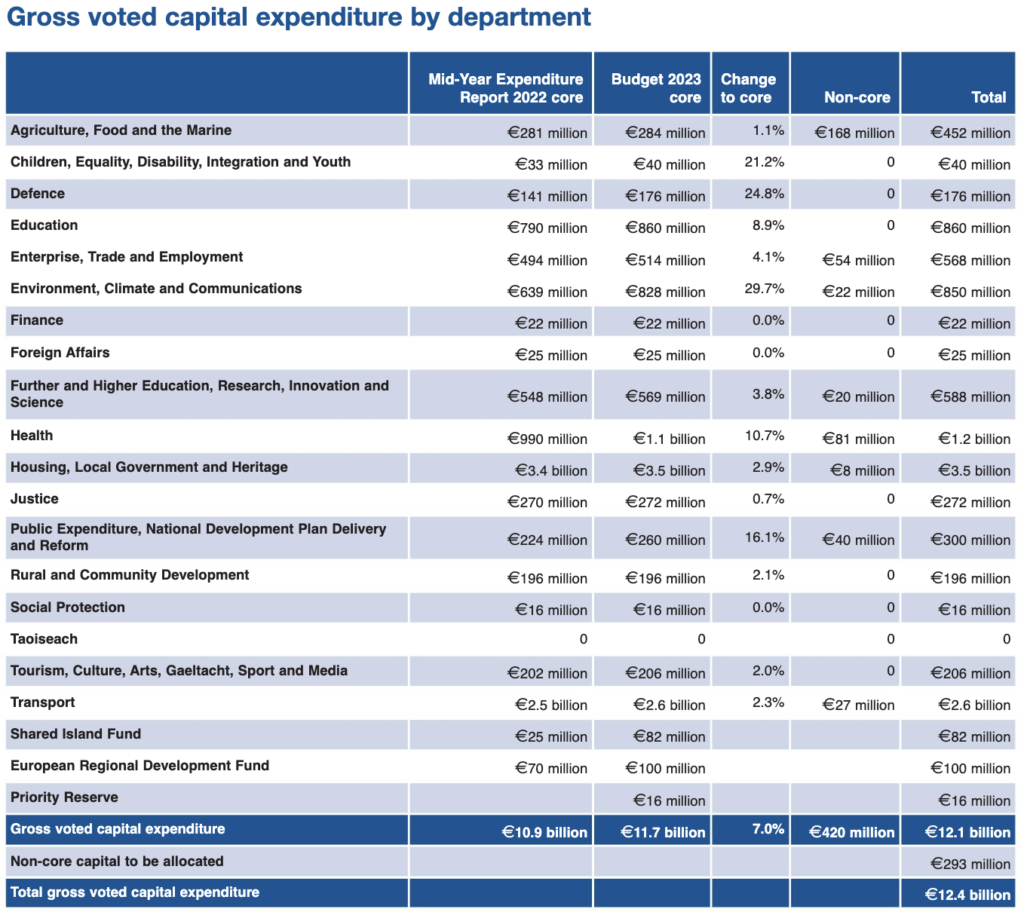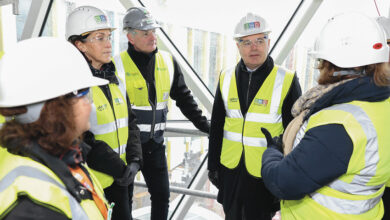Budget 2023 and capital expenditure

Budget 2023 will see capital expenditure in the State increasing by €800 million, in line with the National Development Plan. The Department of Housing, Local Government and Heritage remains the best funded department, accounting for over a quarter of total capital expenditure.
The National Development Plan (NDP) 2021-2030 aligns the Government’s capital expenditure with Ireland’s infrastructural needs for the current decade, with the €800 million increase provided in Budget 2023 accounting for a 7 per cent on the capital expenditure allocation for 2022 that was outlined in the Mid-Year Expenditure Report. Total gross voted capital expenditure in the budget stands at €12.4 billion, with €293 million of that amount as-yet unallocated to a department and the remainder split between 17 government departments, the Shared Island Fund, the European Regional Development Fund, and the Priority Reserve.
In its Budget 2023 Expenditure Report, the Government states that this increase “represents a very substantial commitment of resources and continues the process of increasing voted capital expenditure to 5 per cent of GNI* by 2025”. Taking the latest Central Statistics Office (CSO) figure of GNI*, 2021’s €231.7 billion, the current level of capital expenditure announced in the latest budget accounts for 5.3 per cent of GNI*, but this of course comes with the caveat that GNI* will have grown since 2021.
Expenditure by department
Of the 18 government departments, the Department of Housing, Local Government and Heritage (DHLGH) will receive the most capital funding, which is perhaps unsurprising given the level of housing construction to be centrally funded under Housing for All. The €3.5 billion the department will receive is a 2.9 per cent increase on its 2022 allocation and accounts for 28.4 per cent of total gross voted capital expenditure. The second highest level of funding has been allocated to the Department of Transport, which received a 2.3 per cent increase on its 2022 levels for a total of €2.6 billion. Transport’s share of total gross voted capital expenditure thus stands at 21.2 per cent.
The Department of Health is third in terms of funding, being the third and final department to be allocated over €1 billion in capital funding. Overall, health is allocated €1.2 billion, a 10.7 per cent increase on its 2022 allocation, which means that it accounts for 9.5 per cent of total gross voted capital expenditure.
Significant increases in capital expenditure allocation were seen in many departments, with the Department of the Environment, Climate and Communications receiving the largest increase when compared with 2022 allocations, an increase of 29.7 per cent that will see the department receive €850 million in capital spending budget. The Department of Defence has also seen an almost 25 per cent increase and will receive €176 million in capital funding. The third and last department to receive a funding boost of over 20 per cent is the Department of Children, Equality, Disability, Integration and Youth; a 21.2 per cent increase has seen the Department allocated a capital expenditure budget of €40 million.
Fourteen of the 18 government departments saw increases in their allocations, ranging from the Department of Justice’s 0.7 per cent increase to the Department of the Environment, Climate and Communications’ 29.7 per cent. The Department of Social Protection saw no increase, with its budget standing still at €16 million; also static were the Department of Finance and the Department of Foreign Affairs at €22 million and €25 million, respectively. The Department of the Taoiseach receives no capital expenditure allocation.
Significant increases were also seen in two of the three non-departmental capital funding allocations: the Shared Island Fund saw a 328 per cent increase from its 2022 allocation, from €25 million to €82 million. The Budget 2023 Expenditure Report notes that a further €27 million has been allocated to departments under the auspices of the Shared Island Fund, with the €82 million noted separately as it has yet to be drawn down. The State’s contribution to the European Regional Development Fund also saw an increase of 42.9 per cent, from €70 million to €100 million.
Inflation
However, it must be remembered that these increases are being delivered against the extremely high levels of inflation that were seen in 2022; the CSO records inflation as having ranged between 8.2 per cent and 9.2 per cent – the highest rate of inflation since June 1984 – from June to October 2022. Of the 15 departments to be allocated funding increases, seven (Agriculture, Food and the Marine; Enterprise, Trade and Employment; Further and Higher Education, Research, Innovation and Science; Housing, Local Government and Heritage; Justice; Rural and Community Development; Tourism, Culture, Arts, Gaeltacht, Sport and Media; and Transport) were allocated increases that fell beneath the minimum inflation rate of 8.2 per cent; eight (Education added to the previous seven) saw increases less than the maximum 9.2 per cent rate. The total increase of 7 per cent in capital expenditure also falls beneath both of these rates.
As the Government seeks to deliver multiple initiatives that will require significant capital funding such as Housing for All, the National Broadband Plan, and various other infrastructural improvements covered by the NDP, it will also need to keep an eye on the increases in GNI* if capital expenditure is to reach 5 per cent of its total by 2025. GNI* rose from €195.3 billion in 2017 to €231.7 billion in 2021, an average increase of €7.3 billion per year that comes with the caveat of a €10 billion fall during Covid-affected 2020; if such pace were to continue, GNI* would stand at €268.1 billion in 2025, 5 per cent of which is €13.4 billion. Reaching this would require sustained increases between now and 2025, ultimately resulting in a capital expenditure increase of 8.1 per cent from Budget 2023 to 2025, a rate that is clearly achievable given Budget 2023’s 7 per cent increase.






